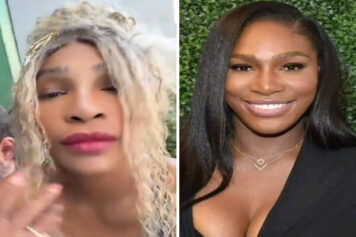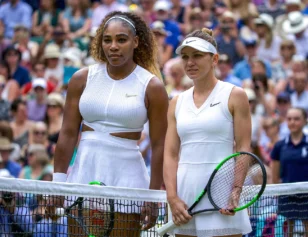Some people would say that Serena Williams is Billie Jean King 2.0. That’s what made King’s suggestion that Serena chill on a celebrity lifestyle that has enabled the tennis legend to empower several generations of women somewhat shocking and perplexing.
“No more Met Galas,” King told the BBC. “Just stop all this insanity because she is trying to be everything.”
Serena’s response wasn’t surprising. It was inspirationally consistent with who she’s been her entire career.
"The day I stop fighting for equality, and for people that look like you and me, will be the day I'm in my grave."
Serena is the 🐐 forever.
🎥 @kylegriffin1— The Shadow League (@ShadowLeague) July 13, 2019
Williams has been fielding these kind of head-scratching questions and addressing ignorant criticisms since she came into the game two decades ago as something the sports world has never seen before; A black woman from Compton who rose to the top of the tennis world and parlayed that success into a global brand that broke racial and gender barriers and helped rewrite history.
As she enters the twilight of her incomparable career as not only one of the most famous people in the world but one of the most respected Black athletes ever. Serena’s inactivity, injuries, and age caught up to her in the Finals of Wimbledon on Saturday against Simon Halep.
Halep played a perfect grass court match and gave the performance of her career in stopping Williams from recording her 24th career major and tying Margaret Court for the most all-time.
After the match, Serena was asked about Billie Jean’s comments. When her response hit the public’s ears, Billie Jean — The Godmother of the women’s empowerment movement in sports — became an unlikely and ironic target.
There is something to be said for knowing when to STFU.
I’m looking at you, Billy Jean King. https://t.co/AIUq16UDbw via @Metro_Sport
— Marlon Weems (@GeekTrader) July 13, 2019
However, King is not some loud-mouth analyst with no credentials just spewing more smoke at Serena’s legacy.
Before Serena became a tennis icon known for crushing opponents, social barriers and being the preeminent voice on issues such as sexism, racism and the gender pay gap, especially as it related to women of color, there was Billie Jean King.
If you aren’t familiar with King’s irrefutable place as one of the most influential figures in American sports history, then simply go to her website www.billiejeanking.com and it will either refresh your memory or enlighten you.
“Named one of the “100 Most Important Americans of the 20th Century” by LIFE magazine, Billie Jean King’s greatest desire is to empower the next generation with the tools to do better than the one before it. An influential visionary who is both highly respected and strikingly innovative, Billie Jean King’s legacy is ever-evolving.”
King did this at a time when societal views on women were still pretty much archaic, oppressive, biased and incredibly damaging to the political, athletic and financial opportunities afforded them in this country. She spearheaded a movement that continues to grow in 2019.
When Serena Williams hit the scene and changed the face of tennis, she not only elevated the game, but she became its new champion for social justice and equality. She replaced King as the mouthpiece for women around the world who want nothing more than to live the life they choose, free of bigotry, chauvinistic chains, and unfounded criticism.
“In 1973, at the height of her competitive years, Billie Jean leveraged her position to spearhead the formation of the Women’s Tennis Association and became its first president. She lobbied for equal prize money for men and women at the U.S. Open, and a sponsor was found to level the playing field. The U.S. Open became the first major tournament to offer equal prize money to both sexes.”
It’s odd that King — the original advocate for equal pay for women in sports — finds herself in this position.
The sports careers of King and Williams are among the most influential and transcending in world history. To see the two women now pitted against each other doesn’t feel appropriate. To think that King was trying to disparage Serena’s career in some way is logically-flawed in my opinion. These women are on the same side of the fight.
Let’s not forget that King has been a mentor to Serena in the past and has encouraged Serena’s social activism and fight for inclusiveness.
In no way was King suggesting that Williams stop fighting for equality, she was just speaking freely as she’s done for the last half-decade. Isn’t that the type of honest, freedom of expression that King fought for her entire career and Williams advocates for every day?
Serena has played the frontline for some time and has overshadowed the legacies of all women tennis players who preceded her.
Billie Jean King’s iconic tennis match against a man who claimed that a woman could never beat him was the watershed moment in women’s tennis.
“In 1973, 90 million people worldwide watched Billie Jean King defeated Bobby Riggs in the “Battle of the Sexes,” 6-4, 6-3, 6-3. No other sporting event has played a more significant role in developing greater respect and recognition for women athletes.”
You at least had to see the movie.
Then, Serena took Billy Jean’s chapter in the rise of women’s rights and wrote her own novel. Billie Jean King’s career bio reads a lot like Serena’s current body of work.
“…Billie Jean King is a preeminent voice in the national conversation surrounding gender equality.
With 39 Grand Slam titles to her name, including a record 20 titles at Wimbledon, Billie Jean King is one of the greatest tennis players of all time. She held the world #1 ranking in women’s tennis for six of the ten years from 1966 through 1975.
Whether she’s in the news, on the news, or writing about the news, one thing is for certain. Billie Jean King always has something to say.”
Maybe the 75-year-old King is out of touch with how the movement works. Maybe she doesn’t understand that celebrity status is the way to get your social platform recognized these days.
Maybe King selfishly doesn’t like the way Serena has overshadowed her legacy. As King reaches the twilight of her life and reflects on her journey, could she be bitter at Serena’s rise and acceptance as a world-changing woman?
Society wasn’t as ready to embrace a strong woman back when King was breaking ground. She received criticism from men and women for her affiliation to the LGBTQ community and wasn’t accepted as a celebrity to the degree that Serena is.
King’s accomplishments and triumphs helped to spark a revolution in women’s athletics, but the resistance was equally as strong. Back then, there were no Harper’s Bazaar opportunities and social media boosts for a woman who refused to compromise her strength and greatness to appease outdated notions and beliefs by men.
Maybe King just wants to see Serena finish her career with the same dedication and excellence she started with. The same tunnel vision that helped elevate her to GOAT status. In any event, the beef isn’t between these two titans. Let’s keep the focus and continue with the theme of unified women changing the world for the better.



